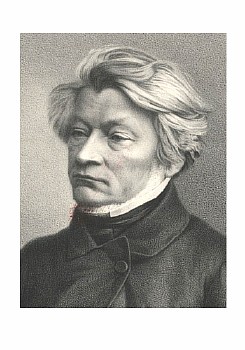|
- - - -
Мицкевич Адам Бернард
MICKIEWICZ Adam Bernard
(24.12.1798 – 26.11.1855)
Poet, playwright, essayist, leader of the liberation movement, founder of the school of Romanticism in Polish poetry
Adam Mickiewicz was born in the village of Zaosie, Baranavichy district, Brest region. In 1807-1815 he studied at the Dominican school in Novogrudok. In 1819 he graduated from Vilnius University, in 1822 he received his Master of Philosophy. In 1819-1823 Mickiewicz worked as a teacher and lived in Kovno (now Kaunas, Lithuania). Mickiewicz was one of the founders of secret patriotic youth organizations - Philomath and Philaret Societies, and in 1823 he was arrested for his activities and membership in these organizations. In 1824 Mickiewicz was sent into exile to Russia, where he lived in Odessa, St. Petersburg and Moscow. In 1829 he got permission to go to Western Europe. Mickiewicz lived in Germany, Italy, Switzerland, since 1832 he stayed mainly in Paris (France). In 1839-1840 he taught Latin literature at the University of Lausanne (Switzerland). From 1840 he held the chair of the Slavic literatures at the College de France in Paris. A lot of famous writers including George Sand attended his lectures. In 1841-1844 he headed the history department of the Literary Society in Paris. In 1844 Mickiewicz was dismissed from his lectures for promoting ideas of Polish messianism; in 1852 he was removed from his post as professor. In 1848 Mickiewicz actively participated in the revolutionary movement in Italy, he created the Polish Legion, which fought on the side of the Italian insurgents. In 1849 he founded and edited a democratic newspaper “The Peoples' Tribune” in Paris, since 1852 he worked at the Library of the Arsenal.
Mickiewicz wrote ballads, poems, dramas. He published his first poem in 1818. In 1822-1823 he issued a two-volume collection of poetry, which marked the beginning of the Romanticism era in Polish poetry. In 1832-1834 Mickiewicz wrote and published in Paris a biggest work - an epic poem “Pan Tadeusz”, which is considered as a Polish national epic and a verbal art masterpiece. Mickiewicz translated into Polish works by F. Voltaire, F. Petrarch, Shakespeare, G. G. Byron, Goethe, and Schiller. During the Crimean War of 1853-1856, in 1855 he went to Constantinople (Turkey), where he intended to organize the Polish and Jewish Legions to help the troops of England and France. Mickiewicz died in Constantinople and was buried in Paris. In 1890 his remains were moved to Krakow (Poland) and buried in a sarcophagus in Wawel Cathedral. There is a crater on Mercury named after him.
Works:
1. Dziela. Wydanie Rocznicowe 1798-1998. T. 1–17. Warszawa: Czytelnik, 1993–2005.
2. Собрание сочинений. Т. 1–5. М.: Государственное издательство художественной литературы, 1948–1954.
3. Выбраныя творы. Мінск: Беларускі кнігазбор, 2003.
Literature:
1. Kleiner J. Mickiewicz. T. 1–2. Lublin: Towarzystwo Naukowe K.U.L. 1948.
2. Яструн М. Мицкевич. М.: Молодая гвардия, 1963.
3. Kronika zycia i tworczosci Mickiewicza. T. 1–8. Warszawa, 1957–1978.
4. Koropeckyj R. R. Adam Mickiewicz: the life of a romantic. Ithaca: Cornell University Press, 2008.

© National Academy of Sciences of Belarus, 2011
|
|


